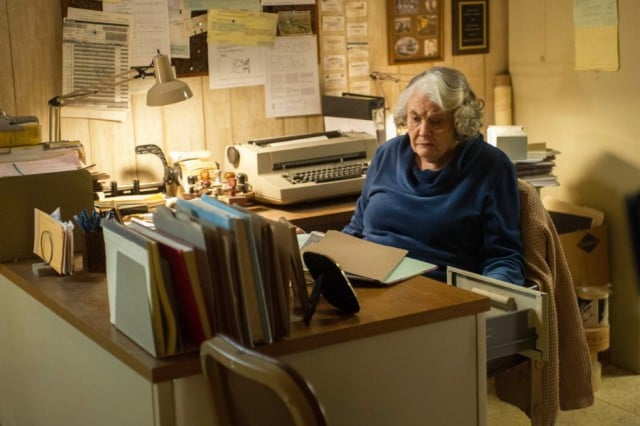The Americans, Season 3, Episode 9: “Do Mail Robots Dream of Electric Sheep?”
Written by Joshua Brand
Directed by Stephen Williams
Airs Wednesdays at 10pm (ET) on FX
While last week’s episode, “Divestment,” showcased the emotional violence caused by the characters of The Americans, this week’s Phillip K. Dick-referencing “Do Mail Robots Dream of Electric Sheep?” focuses on actual physical violence and its effects. It’s an idea that’s been explored thoroughly on the show (through the infamous suitcase scene, the tooth extraction, and many other aspects), but the most recent hour is particularly notable for the way in which it contrasts how various characters react to the murders (or forced suicides, which are more or less the same thing) for which they’re responsible. No major players in the series’ universe are lost, but the two killings are, in their own way, two of the more devastating moments on The Americans in recent memory.
First to go is Todd, whose demise comes at the hands of Hans near the beginning of the first act. The episode opens with Elizabeth informing him that he’ll no longer be able to work with the KGB due to the college student seeing his face, and Hans’ desire to continue helping the organization leads him to shoot Todd. The shot isn’t lethal, kicking off a prolonged showdown between the two characters.
On one level, the scene functions as one of the best action sequences on the show in a while. Director Stephen Williams’ use of handheld camera to shoot the fight helps push the tension of their struggle. Still, the quick cuts between the faces of the two characters is the most memorable part of the scene. As Todd’s face, already bloody from the gunshot, gets beaten to a pulp, the viewer can’t help but think of Elizabeth’s speech proclaiming Todd’s innocence. As cold-blooded as she can be, she didn’t quite have the heart to murder him, but Hans does. Accordingly, the close-ups of his face during the scene force us to confront his brutality with a discomforting proximity.
The complex triangle between his feelings, Elizabeth’s, and ours continues when he informs her of his actions. Her initial display of shock quickly transitions to empathy as she realizes how the killing indicates his commitment to the cause, and, we imagine, reflects her own brutality. Keri Russell, always excellent, does a particularly good job in this scene of conveying the swing of Elizabeth’s emotions.
Even more impressive is how the audience isn’t left to be a passive viewer of her struggle. Our thoughts become as tangled as Elizabeth’s at the end of the scene, when Hans talks of his commitment to ending apartheid. As with Ruben’s speech last week when he kills Eugene, we agree with the political views being stated, but we can’t bring ourselves to justify the violence being shown. The Americans constantly asks us whether the ends can possibly justify the means, while simultaneously suggesting that there is no right answer, and this contradiction is a big source of the series’ power.
The contradiction is linked closely with yet another contradiction, which becomes apparent during the episode’s other murder. When Elizabeth commits one of her most inhumane actions, she comes across as being more human (or at least unreservedly honest) than she does at any other point in the series.
This is referring, of course, to her murder of Betty. When she’s unlucky enough to be in the office working as Phillip and Elizabeth arrive to bug the Mail Robot (turns out that Gaad’s abuse of the machine wasn’t mere comic relief after all), Elizabeth runs into her, in the suspenseful conclusion to the first act. Their confrontation becomes the focal point of “Do Mail Robots Dream of Electric Sheep,” to the point where it almost feels like it could have made for an excellent bottle episode on its own.
Regardless, within the context in which it does appear, it becomes a fascinating opportunity for Elizabeth to reflect on various aspects of her situation, and Betty makes for a compelling marital foil to her executioner.
Although the episode does focus primarily on violence and the machinations of spying, Phillip and Elizabeth’s romantic relationship also gets foregrounded, due to his marriage to Martha. She suggests that Phillip should break off the relationship, ostensibly for the good of the mission, but him, Gabriel, and the viewer all recognize the emotional motivations which lie beneath her suggestion. They become apparent again when she repeatedly brings up the unfeigned feelings she suspects him of having for Martha as he attempts to bug the Robot.
This all becomes particularly noteworthy when juxtaposed against Betty’s tale of her marriage. Although we can only assume that her relationship wasn’t contrived by a governmental organization for political purposes, it sounds as if it had shortcomings familiar to the Jennings’ relationship. She and her husband are married twice, and Betty seems to imply that their second attempt occurs merely out of convenience, rather than affection. He keeps secrets from her, as Phillip and Elizabeth do from each other, and it’s unclear whether either marriage was “better” than the other. Just as the show often refuses to pass judgement on political views or nations, this scene finds it holding a similarly disinterested view of arranged v. unarranged marriage.
Their encounter only becomes more interesting with the episode’s final scene. As Phillip and Gabriel play Scrabble, they begin discussing marriage, and Phillip’s admission to loving Elizabeth, combined with Gabriel’s recounting of her choosing him, shows some semblance of authenticity in their relationship.
Or maybe that’s not what really matters, the episode suggests. In the “real” marriage described by Betty, there appears to be just as much deception as in the sham relationship of the Jennings, so perhaps it’s the viewer’s notion of what is or isn’t real that is to blame. As always, The Americans lets us decide for ourselves.



